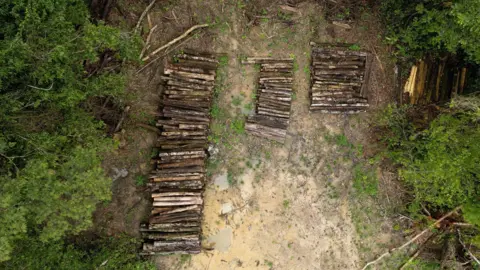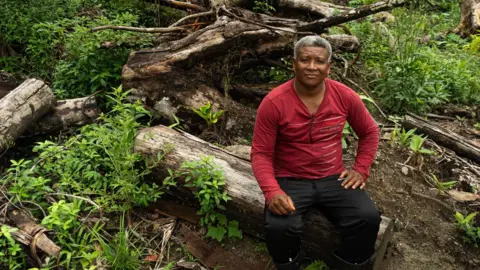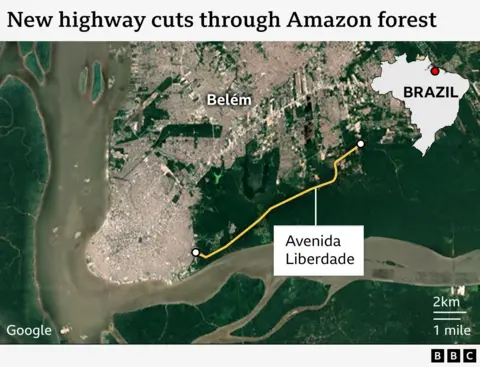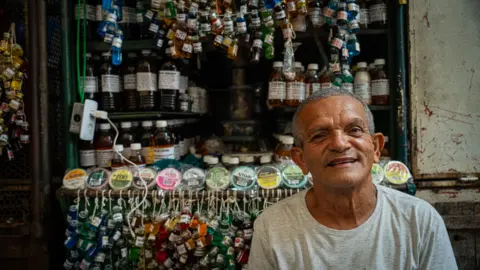Amazon Forest Felled to Build Road for Climate Summit
In staggering hypocrisy, thousands of acres of the Amazon rainforest, one of the most vital ecosystems for global carbon sequestration, have been razed to construct a road leading to a climate summit.
As world leaders prepare to discuss carbon reduction and environmental policies, their actions directly contradict their message. This shocking decision raises serious concerns about the integrity of international sustainability efforts and the real impact of so-called green initiatives. This article uncovers the full extent of the environmental damage and questions the credibility of global climate leadership.
A new four-lane highway cutting through tens of thousands of acres of protected Amazon rainforest is being built in the Brazilian city of Belém for the COP30 climate summit.
It aims to ease traffic to the city, which will host more than 50,000 people - including world leaders - at the conference in November.
The state government touts the highway’s “sustainable” credentials, but some locals and conservationists are outraged at the environmental impact.
The Amazon plays a vital role in absorbing carbon for the world and providing biodiversity, and many say this deforestation contradicts the very purpose of a climate summit.
Along the partially built road, lush rainforest towers on either side - a reminder of what was once there. Logs are piled high in the cleared land, stretching more than 13km (8 miles) through the rainforest into Belém.
Diggers and machines carve through the forest floor, paving over wetlands to surface the road, which will cut through a protected area.
 BBC / Paulo Koba
BBC / Paulo Koba
Claudio Verequete lives about 200m from where the road will be. He used to make an income from harvesting açaí berries from trees that once occupied the space.
“Everything was destroyed,” he says, gesturing at the clearing.
“Our harvest has already been cut down. We no longer have that income to support our family.”
He says he has received no compensation from the state government and is relying on savings.
He worries the construction of this road will lead to more deforestation in the future, now that the area is more accessible for businesses.
“We fear that one day someone will come here and say: ‘Here’s some money. We need this area to build a gas station or to build a warehouse.’ And then we’ll have to leave.
“We were born and raised here in the community. Where are we going to go?”
 BBC / Paulo Koba
BBC / Paulo Koba
His community won’t be connected to the road, given its walls on either side.
“For us who live on the side of the highway, there will be no benefits. There will be benefits for the trucks that will pass through. If someone gets sick and needs to go to the center of Belém, we won’t be able to use it.”
The road leaves two disconnected areas of protected forest. Scientists are concerned that it will fragment the ecosystem and disrupt wildlife movement.
Prof Silvia Sardinha is a wildlife vet and researcher at a university animal hospital that overlooks the site of the new highway.
She and her team rehabilitate wild animals with injuries predominantly caused by humans or vehicles.
 BBC / Paulo Koba
BBC / Paulo Koba
Once healed, they release them back into the wild – something she says will be more complicated if a highway is on their doorstep.
“From the moment of deforestation, there is a loss.
“We are going to lose an area to release these animals back into the wild, the natural environment of these species,” she said.
“Land animals will no longer be able to cross to the other side, reducing the areas where they can live and breed.”
The Brazilian president and environment minister say this will be a historic summit because it is “a COP in the Amazon, not a COP about the Amazon.”
The president says the meeting will provide an opportunity to focus on the Amazon’s needs, showcase the forest to the world, and present what the federal government has done to protect it.
But Prof Sardinha says that while these conversations will happen “at a very high level, among business people and government officials,” those living in the Amazon are “not being heard.”

The state government of Pará had touted the idea of this highway, Avenida Liberdade, as early as 2012, but it had repeatedly been shelved because of environmental concerns.
Various infrastructure projects have been resurrected or approved to prepare the city for the COP summit.
Adler Silveira, the state government’s infrastructure secretary, listed this highway as one of 30 projects in the city to “prepare” and “modernize” it so “we can have a legacy for the population and, more importantly, serve people for COP30 in the best possible way.”
Speaking to the BBC, he said it was a “sustainable highway” and an “important mobility intervention.”
He added that it would have wildlife crossings for animals to pass over, bike lanes, and solar lighting. New hotels are also being built, and the port is being redeveloped so cruise ships can dock there to accommodate excess visitors.
Brazil’s federal government is investing more than $81m (£62m) to expand the airport’s capacity from “seven to 14 million passengers.” A new 500,000 sq-m city park, Parque da Cidade, is under construction. It will include green spaces, restaurants, a sports complex, and other facilities for the public to use afterward.
 BBC / Paulo Koba
BBC / Paulo Koba
Some business owners in the city’s vast open-air Ver-o-peso market agree that this development will bring opportunities for the town.
“The city as a whole is being improved, it is being repaired, and many people are visiting from other places. It means I can sell more and earn more,” says Dalci Cardoso da Silva, who runs a leather shoe stall.
He says this is necessary because when he was young, Belém was “beautiful, well-kept, well cared for, “but it has since been “abandoned” and “neglected” with “little interest from the ruling class.”
João Alexandre Trindade da Silva, who sells Amazonian herbal medicines in the market, acknowledges that all construction work can cause problems. Still, he felt the future impact would be worth it.
“We hope the discussions aren’t just on paper and become real actions. And the measures, the decisions taken, really are put into practice so that the planet can breathe a little better and the future population will have a little cleaner air.”
That will also be the hope of world leaders who choose to attend the COP30 summit.
Scrutiny is growing over whether flying thousands worldwide and the infrastructure required to host them is undermining the cause.

Sign up for our Future Earth newsletter to keep up with the latest climate and environment stories with the BBC’s Justin Rowlatt, delivered every Tuesday. Outside the UK? Sign up to our international newsletter here.
Follow this link to the copied article » GO
Hold the UN Accountable & Demand Real Climate Action
The UN’s Climate Hypocrisy Must Be Exposed!
While world leaders claim to fight deforestation and carbon emissions, their actions prove the opposite. Destroying the Amazon—the world’s largest carbon sink—to build a road for a climate summit is beyond hypocrisy; it’s an environmental disaster.
What You Can Do:
✅ Share this article – Spread the truth and demand transparency from global leaders.
✅ Expose greenwashing & corporate-backed climate agendas – Call out environmental hypocrisy in policymaking.
✅ Support real sustainability solutions – Invest in circular economy projects, genuine carbon offset initiatives, and corporate accountability.
✅ Hold world leaders accountable – Challenge empty pledges and demand measurable environmental action.
Help This Go Viral! Share This Now and join the movement against climate hypocrisy.
You can return to the main Market News page, or press the Back button on your browser.

